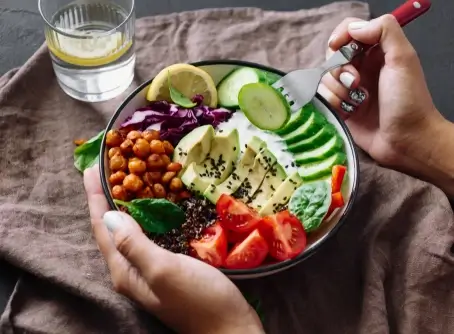Poor sleep, stress and anxiety are all normal and understandable reactions to the current COVID-19 pandemic we find ourselves in. These are extraordinary, unprecedented times after all.
In fact, esteemed Australian psychology and psychiatric authorities estimate that every individual is ‘carrying’ a 10-15% overlay to normal levels of anxiety in the current climate.
Fortunately, there are many strategies that can be implemented to combat poor sleep, stress and anxiety. Focusing on the factors that we can control to promote positive mental health and physical health is as important as ever. Let’s take a look at how our nutrition choices, and small changes, can make a positive difference.
Healthy eating = healthy sleeping
-
Improve sleep by avoiding stimulants such as caffeine, chocolate and alcohol in the afternoon and evening. Ideally, avoid caffeine at least 6 hours before going to sleep.
-
Avoid reaching for packaged and sugary foods as they can increase feelings of anxiety, increase cravings and fatigue.
-
Instead of late night chocolate biscuits, try walnuts – they’re a good source of tryptophan, a sleep-enhancing amino acid that helps make serotonin as well as melatonin which is the ‘body clock’ hormone that sets your sleep-wake cycle.
-
Add healthy fats to your meals – they are essential for brain health, reducing inflammation and helping to stabilise mood. Include oily fish in your dinner for a sleep inducing meal option. They are high in vitamin B6, which your body needs to make the sleep enhancing hormones melatonin and serotonin.
-
Fish such as salmon will also help to stabilise serotonin levels, which your body uses to manage stress.
-
Drink plenty of water throughout the day – even mild dehydration can make you tired.
-
Avoid skipping meals to prevent fluctuations in blood sugar levels which can lead to unhealthy cravings and fatigue.
-
Eating low GI foods such as wholegrain foods, fruit and vegetables will help maintain your energy levels during the day.
-
Enjoy smaller, lighter meals in the evening rather than high-fat or heavy meals that can slow down your digestive system. If you get struck down with heart burn, you’re more likely to experience sleep problems and disorders such as insomnia, sleep apnoea, restless leg syndrome and daytime sleepiness.
-
A nightly cup of tea (without caffeine) can be a perfect relaxing ritual. Chamomile, ginger, and peppermint are calming choices for bedtime.
Health by Design is here to help you navigate the many challenges of employee mental health and physical health during the COVID-19 outbreak. Contact us today if you need extra support.

